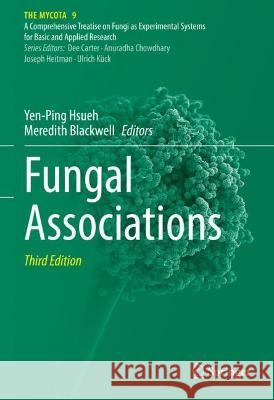Fungal Associations » książka



(netto: 651,74 VAT: 5%)
Najniższa cena z 30 dni: 682,72
ok. 16-18 dni roboczych.
Darmowa dostawa!
Yen-Ping Hsueh was born in Taipei, Taiwan. Biology has always been her favorite subject in school so she followed her interest and majored in Plant Pathology and Microbiology at the National Taiwan University as an undergraduate. She received B.Sc. (2001) and M.Sc. (2003) degrees, and moved to Duke University to pursue her PhD under the guidance of Dr. Joseph Heitman. Her PhD work mainly focused on the sexual cycle of the human fungal pathogen Cryptococcus neoformans. After receiving her Ph.D. in Molecular Genetics and Microbiology from Duke University in 2008, she continued to work with Heitman briefly and then moved to Cal Tech to start her postdoctoral training with Dr. Paul W. Sternberg in 2010. Her postdoctoral work was an investigation of the interactions between nematode-trapping fungi and the model nematode C. elegans.
In 2015 Hsueh returned to Taiwan, to begin her independent career at the Institute of Molecular Biology in Academia Sinica where she is currently an Associate Research Fellow. Her laboratory studies the predator-prey interactions between carnivorous fungi and the model nematode Caenorhabditis elegans. Members of the Hsueh lab explores different aspects of the biology of these predator-prey systems and are striving to understand the mechanisms that underlie their interactions and coevolution. They hope to harness the nematocidal potential of the carnivorous fungi, which will facilitate the discovery of a novel treatment or biocontrol method to combat parasitic nematode infections in plants, animals, and humans in the future. Because of her original research, Hsueh has been recognized as an EMBO Global Investigator, EMBO Young Investigator and more recently, a Taiwan Outstanding Women in Science Young Talent Award and is an active participant in the international scientific community.
Meredith Blackwell, born in Abbeville, Louisiana, spent her early years on the banks of the Vermilion Bayou and attended public schools in Louisiana. As an undergraduate pursuing liberal arts interests, a deep-sea fishing trip led her to become a biology major (BS, University of Louisiana, 1961). She studied ichthyology at the University of Alabama (MS, 1963), and began a PhD at the University of Texas at Austin in 1964. At Texas she eventually came under the guidance of C. J. Alexopoulos, and her enduring interest in Mycology developed (PhD, 1973). During postdoctoral research with Henry Aldrich and James Kimbrough at the University of Florida, she was introduced to insect-associated fungi. She spent the first 6 years of her career in a primarily a teaching position at Hope College, Holland, Michigan.
The next 33 years (1981-2014) were spent in the Department of Biological Sciences, Louisiana State University, where she attained the rank of Boyd Professor. Her research supported by NSF included studies of desert myxomycetes, phylogeny of Laboulbeniomycetes and other insect ectoparasites, and the taxonomic and geographic distribution of insect-associated yeasts. Since 2014 she has lived in Columbia, South Carolina, where she is an affiliate in the Department of Biological Sciences at the University of South Carolina. Blackwell is a former president of the Mycological Society of America (MSA) and the International Mycological Association (IMA). She is a fellow of the British Mycological Association, MSA, IMA, and the American Academy of Arts and Sciences. She has received several mycological awards and is proud to share her name with a number of fungal taxa.
Fungi are associated with a wide variety of other organisms. Ecologist Peter Price has said, “mutualism facilitates adaptive radiation,” and many biologists attribute Earth’s great fungal diversity to such associations. The 3rd edition of The Mycota, Vol. 9: Fungal Associations, has been revised to provide entirely new coverage of fungi and associated organisms in fourteen informative discussions that take advantage of today’s large public databases and modern molecular and data analysis methods. The editors have a keen interest in fungal associations in their own research, and their perspectives from different generations have resulted in an interesting treatment of the subject.
Fungal Associations includes updates of classic topics, but also introduces less frequently discussed associations and broader reflections on the nature of fungi and their associates.
- The volume begins with a look at more than a billion years of fungal evolution and associations through the lens of immunology.
- Can fungi involved in obligate symbioses be cultivated apart from the host? Genomes help to answer the question.
- The ultimate intimacy between fungi and certain unrelated organisms has resulted in DNA exchange that can be traced in extant genomes.
- Fungi and bacteria use volatile compounds to lure participants into interactions.
- Some viruses modify the phenotype of their fungal hosts and affect host fitness.
- Details of interactions between classical examples of fungus—plant symbioses (lichens, several types of mycorrhizae, and toxic endophytes) benefit from advanced microscopic and molecular techniques.
- Discussions of fungi associated with insects (entomopathogens, a Drosophila model to study entomopathogens), nematode-trapping fungi and their prey, and a group of termite-associated fungi that produce secondary metabolites with potential uses as pharmaceuticals, complete the volume.
Fungal Associations is a well-illustrated, thought-provoking resource for specialists and generalists, including researchers, lecturers, and students interested in ecology, evolution, microbiology, and mycology. The volume would be an excellent text for a seminar course for advanced undergraduate or graduate students.
1997-2026 DolnySlask.com Agencja Internetowa
KrainaKsiazek.PL - Księgarnia Internetowa









